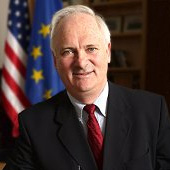Author
John Bruton

Prime Minister of Ireland, 1994-97
As prime minister of Ireland (Taoiseach) from 1994 to 1997, John Bruton helped transform the Irish economy into the "Celtic Tiger," one of the fastest-growing economies in the world. In the year before he took office, the Irish economy grew by 2.7%. During his tenure as prime minister, the Irish economy grew at an average rate of 8.7% a year, peaking at 11.1% in 1997.
Mr. Bruton was also deeply involved in the Northern Irish Peace Process leading to the 1998 Good Friday Agreement, under whose terms a conflict of allegiances dating back to the 17th century was resolved.
In 1996, Mr. Bruton presided over Ireland’s successful turn in the EU Presidency, during which the Stability and Growth Pact, which governs the management of the single European currency, was finalized.
From 2004 to 2009, Mr. Bruton served as the EU’s ambassador to the United States.
John Bruton was first elected to the Irish Parliament ("Dil éireann") in 1969 at the age of 22 as a member of the Fine Gael Party, becoming Party Leader in 1990 and leading it into government in 1994.
He previously served as Ireland’s Minister for Finance (1981-1982 and 1986-1987), Minister for Industry & Energy (1982-1983), Minister for Trade, Commerce & Tourism (1983-1986) and was Parliamentary Secretary (Junior Minister) from 1973-1977. He has also been opposition spokesman on Agriculture and on Education.
Mr. Bruton graduated from University College Dublin with a Bachelor’s degree in economics and politics before studying to become a barrister. He was called to the Bar of Ireland in 1972. He holds honorary degrees from Memorial University of Newfoundland and the National University of Ireland.